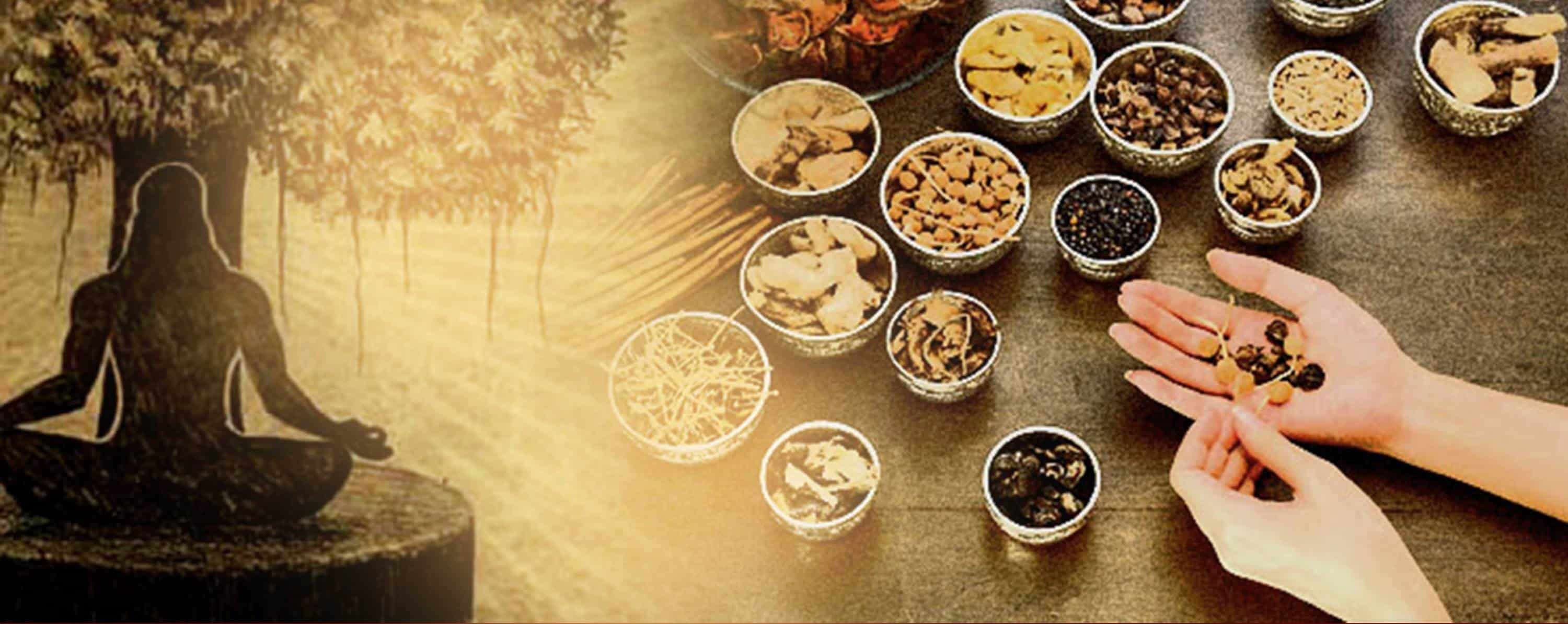What is Ayurveda? | History, Principles, Doshas, FAQs

Ayurveda, the ancient system of medicine, traces its origins back to the very beginning of life. From birth, all living beings face the challenges of survival and diseases. Humans, with their intelligence, have extensively researched and discovered remedies, giving rise to the evolution of Ayurveda.
This article aims to reconnect us with our forgotten healing roots, emphasizing the prevention of diseases. And try to strengthen our well-being through nature and classical Ayurveda.
What is Ayurveda?
Ayurveda, derived from the Sanskrit terms 'Ayur,' meaning life, and 'Veda,' meaning science or knowledge, focuses on natural ways and herbal medicines to enhance overall wellness.
It is the world's oldest medical science, originating in India and used effectively for thousands of years.
Maharishi Charaka, an ancient Indian physician, and scholar, is credited as the father of Ayurveda for organizing its principles and practices.
His compilation, the Charaka Samhita, covers anatomy, physiology, diagnosis, and treatment methods, shaping the understanding and practice of this ancient healing system.
History and Evolution of Ayurveda
Ayurveda was first mentioned in Atharva Veda, where several diseases and their treatments were detailed. Later, during the 6th Century BC to the 7th century AD, known as the Samhita period, a more organized and methodical development took place regarding Ayurveda.
As per texts, Ayurveda originated about 5,000 years ago, thanks to the ancient rishis or seers of India who recorded their knowledge of herbs.
Ayurveda suggests a link between medicine and the Vedas, or the origin of Ayurveda can be attributed to the Vedas. Vedas, specifically Atharva Veda, is about living a healthy and balanced life and mentions various illnesses and their treatments.
Tracing the Ancient Knowledge from Gods to Sages
According to Hindu Mythology, God Brahma created Ayurveda and passed his knowledge to his son, DakshaPrajapati. It was then communicated to the Vedic gods, Ashwini Kumaras. In those times, they became the physicians of the gods and were known as the ‘Dev’ of Ayurveda.
This knowledge was then transmitted to God Indra, who had three physicians as his pupils: Aacharya Divodas Dhanvantari, Acharya Bharadwaj, and Acharya Kashyapa. The flow of knowledge went on to the next generations.
From Bharadwaj’s teaching, the student Agnivesha picked and formulated the Ayurvedic text of internal medicine. Agnivesha’s disciple, Acharya Charak, did more work. That is how the knowledge was passed down from Gods to sages.
For the survival of humanity, prevention of suffering, and spreading awareness, many rishis and munis dedicated their lives and wrote their findings in the holy book of Vedas. Rishi Bharadwaja, who lived around 700 BC, did commendable work in authoring Ayurveda.
Principles of Ayurveda for Holistic Well-being
The basic concept of Ayurveda teaches us that any disease begins when one disturbs the harmony of the body or mind with the surrounding environment.
When any of our five senses go against the environment, the body weakens and causes discomfort within, resulting in the form of disease. This environment is conducive to the growth of bacteria, viruses, and other pathogens, causing dysfunction of organs and nervous system. In other words, it interrupts the flow of energy in the body.
There can be several implications of understanding the cause of disease. But in simple words, if disharmony has caused the disease, the cure is restoring harmony. This is the underlying principle of Ayurveda. So jotting down three basic principles of Ayurveda, which always hold true and do not vary individually–
1. Prevention of Illness
Ayurveda emphasizes the importance of proactive measures to prevent illness rather than solely responding to it after it has occurred.
By adopting a preventive approach, individuals can maintain optimal health and well-being.
2. Harmony between Body, Mind, and Environment
Ayurveda recognizes the close interconnection between the body and mind. It emphasizes maintaining a harmonious balance between the two and the surrounding environment.
This balance is crucial for overall health and vitality.
3. Healthy Nutrition, Daily Movements, and Herbal Remedies
Ayurveda advocates for a mindful approach to nutrition, emphasizing the consumption of wholesome and nourishing foods.
Additionally, regular physical movements and exercises tailored to individual needs are recommended. Ayurveda also harnesses the healing power of herbal remedies, which significantly restore and maintain wellness.
Ayurveda strongly believes that every individual can heal himself. You need to understand the dosha type, potential imbalances, and how to take control if your health goes for a toss.
Doshas: Personalized Approach in Ayurveda
Human interaction with the outer world is dictated by our five senses, known as the five organs of perception - hearing, sight, touch, smell, and taste.
We all know this fact, but most don’t know that each sense is related to one of the five elements - ether, air, fire, water, and earth.
Every human body is unique, and a combination of five vital elements in variable proportions impacts the Koshas or the layers. Let us know about the five elements, the koshas or Maha Bhutas.
The Elements
Earth
Strongest of all, Earth indicates stability, represented in bones, nails, and teeth in the body. It forms the physical sheath of our being called Annamayakosha.
The earth element is related to the sense of smell.
Water
Always flowing and dissolving like a liquid, represented as blood, water, and lymph in the body.
It is the energy sheath known as Pranamayakosha. Water is related to the organ of taste.
Fire
This is the Energy or heat, transformation, and metabolism. It represents the digestive system and regulates body temperature.
It is the mental-emotional sheath known as Manomayakosha, which creates our thoughts and emotions. The fire element is related to the organ of sight.
Air
Indicative of motion and lightness. It represents the body’s respiration process and the movement of nerve impulses.
This is the wisdom sheath known as Vijnanamayakosha. Air is related to the sense of touch, the skin.
Ether
Indicative of space, omniscience, and emptiness. It represents the body’s space between cells, commonly known as the bliss sheath or Anandamayakosha.
It is related to the ear, organ of hearing, and expression of speech. Ether is the medium through which sound is transmitted.
The Three Doshas
These five elements may look separate, but combining them gives rise to them. The doshas are responsible for the psychological and physiological characteristics that make us, what we are, how we are, what we like/dislike, how we react to situations, and our body’s weaknesses and strengths.
Therefore, understanding our nature or constitution is termed the science of Tridosha. Tridosha signifies the three fundamental energies or principles, known as Vata, Pitta and Kapha, which govern the function of our bodies on the physical and emotional level.
Each of us has a unique balance of all these three energies, which makes us different from others. And that’s why Ayurveda says no two people can be treated similarly.
The three Doshas should be balanced for health and vitality. Everyone has all three Doshas, but generally, one or two dominate, determining one’s characteristics, tendencies, and traits.
Vata (Air and Ether)
Vata Dosha being the combination of Air and Ether, is the most powerful of the Doshas, being the life force itself. Vata force creates movement, and controls breathing, impulses, blinking, sensual acuteness, and heart pulsation.
Vata type of people tend to be lean, light, and tall. When this Dosha is in balance, people are creative and flexible; but when it goes out of balance, people are unstable, anxious, and fearful, and suffer from insomnia, poor digestion, loss of sensory balance, fatigue, and psychological problems.
The attributes that help recognize Vata Dosha are dry, cold, rough, subtle, light, mobile, hard, changeable, and clear. Vata affects these parts of the body-hips, thighs, colon, ears, bones, and the sense of touch.
Its imbalance is first noticed with colon disturbance, where it accumulates. Through Ayurveda, this can be identified, and the imbalance can be cured by expelling the toxins out of the body.
Pitta (Fire and Water)
Pitta Dosha combines Fire and Water, associated with metabolism, digestion, assimilation, and body temperature. If you’re a Pitta type, you may experience heartburn, the most common Pitta disorder, after eating hot, spicy foods. You require a coolant or more alkalizing food to pacify this fire inside the body.
Pitta’s usual attributes are oily, sharp, hot, mobile, and liquid. Pitta type of people tend to have medium muscular builds; they are warm, extroverted, leaders, and quick decision-makers.
When the pitta is imbalanced, it makes the person angry and hostile, short-tempered resulting in high blood pressure and heart disease.
Kapha (Water and Earth)
Kapha Dosha combines Water and Earth, associated with muscles and bones. It is like a “glue” that holds the cells together. Kapha types tend to have heavier builds with larger bones.
When they are in balance, they are peaceful and stable soles, loving and forgiving, though possessive and greedy. In the body, it is manifested in the form of congestion, respiratory issues, and so-called ‘obesity’.
Kapha attributes include heavy, cloudy, slow, cold, oily, smooth, dense, and static. Kapha imbalance can cause diseases like diabetes, hyperglycemia, and nervous disorders.
Balancing the Doshas
You may also find a mix of characteristics, and that is called Dual Dosha Prakriti. Pure Dosha prakriti is less common but considered better than the dual Dosha type.
There is also a possibility of Tridosha Prakriti, which is the rarest but the best of all. It consists of equal characteristics of Vata, Pitta, and Kapha. Whatever may be the Dosha type, they must be balanced for a healthy and happy being.
Dosha balance is maintained by both the diet and the lifestyle guidelines given by Ayurveda. Let’s know in detail, the ways to create a balance of Doshas, for harmony, health, and happiness.
Diet for Dosha Balance
To know the right diet for you, you should understand the six tastes. The six tastes of food are derived from the five elements, ether, air, fire, water, and earth. The taste chosen can either strengthen the doshas or reduce their effect.
Ayurveda recommends that we should have all six tastes, sweet, sour, salty, pungent, bitter, and astringent in every meal, to make it nutritious and satisfying.
How is the taste related to Dosha?
These are the six tastes in Ayurveda and their corresponding elemental effects. Each taste has a unique combination of elements and affects the doshas (Vata, Pitta, and Kapha) in different ways.
Here's a table summarizing the tastes and their corresponding elemental effects:
| Taste | Elements | Effects |
|---|---|---|
| Sweet | Earth and Water | Increases Kapha, decreases Vata and Pitta |
| Sour | Earth and Fire | Increases Pitta and Kapha, decreases Vata |
| Pungent | Fire and Air | Increases Vata and Pitta, decreases Kapha |
| Bitter | Air and Space | Increases Vata, decreases Pitta and Kapha |
| Salty | Water and Fire | Increases Pitta and Kapha, decreases Vata |
| Astringent | Air and Earth | Increases Vata, decreases Pitta and Kapha |
With the readable display of 6 tastes and their effect on Dosha, each one of us can make the right food choices.
As stated above, each Dosha is a combination of two elements, out of the five basic elements of Earth. The remaining three elements need to be added to the food, to create the right balance.
How to Balance Your Dosha: Balancing the Three Doshas with Diet and Lifestyle
To maintain the proper balance of your unique combination of Doshas, follow the practices stated below:
Balancing Vata
Vata is indicative of air or movement. When imbalanced, Vata disturbs the mind and body with unpredictable appetite, restlessness, constipation, insomnia, etc.
Many individuals prefer an unorganized routine, but Vata Vata-influenced constitution requires a person to be organized, follow a pattern, and maintain stability in mind.
Signs of Vata Imbalance
- Constipation, gas, bloating, hard stools
- Disturbed sleep
- Feeling of nervousness and anxiety
- Spastic twitches
- dry or chapped skin
- low body weight
Follow this routine –
Diet
- Follow a Vata-pacifying diet - If you eat more aerated foods and the food tastes pungent, bitter, or astringent, then it will aggravate or imbalance your Vata Dosha.
- To balance, you should eat food consisting of the remaining three elements like earth, water, and fire, i.e. food that is sweet, sour, and salty.
- Eat freshly prepared warm food and warm beverages. Avoid raw or gas-forming vegetables (cabbage, broccoli, cauliflower etc.)
- Consume oil and ghee more liberally.
- Avoid alcohol, coffee, and chocolate (except dark/ raw ones); instead have hot milk with cardamom before bed.
Lifestyle
- Sleep early by 10 PM
- Practice Meditation and Pranayama
- Moderate exercise, not excessive, like walking and yoga is good
- Abhyanga or self-massage with sesame oil
- Nasya with sesame oil
Balancing Pitta
Pitta is indicative of metabolism and transformation. When imbalanced, Pitta Dosha causes excessive heat and acidity in the body, resulting in temper, indigestion, fever, and skin rashes.
The pitta-influenced constitution needs to calm down and not take things too seriously.
Signs of Pitta Imbalance
- Acidity and burning sensations in the stomach
- Hormonal imbalances like Infertility, menopausal symptoms
- Sweat, hot flushes
- Urinary tract infection and other inflammations
- Headaches
- Nose bleeding, Piles, etc.
- Burning Eye and other related disorders
Follow this routine –
Diet
- Follow a Pitta-pacifying diet – Prefer cooling food, beverages, and spices like coriander, cardamom, fennel, etc. Avoid canned food. Eat freshly prepared food, avoiding chili, pepper, vinegar, etc.
- Stay away from excess alcohol, tobacco, caffeinated beverages, and chocolate (except dark/ raw ones). Have warm milk before bedtime.
- Drink copper-charged water, especially in the mornings.
Lifestyle
- Sleep before 10 PM, avoiding screen time in the last hours.
- Have a relaxed time with children, friends, and family.
- Exercise such as swimming, skiing, cycling, and walking are good, but avoid overheating.
- Avoid exposure to midday sun.
- Practice Meditation and Pranayama
- Abhyanga self-massage with coconut oil and olive oil
- Nasya with ghee or sesame oil
Balancing Kapha
Kapha indicates structure. When imbalanced, Kapha causes issues related to accumulation, such as lethargy, obesity, slow digestion, cold, cough, and depression. The kapha-influenced constitution needs mental and physical stimulation and activity to stay in balance.
Signs of Kapha Imbalance
- The body gains weight or becomes obese, which is a result of slow and sluggish digestion of food.
- An occurrence of Water retention and swelling in the body.
- Increased frequency of cold, congestion, or cough.
- The increased sugar level in the body which results in diabetes.
- Increased cholesterol and triglyceride levels in the body.
- Feeling lethargic is a very common sign of Kapha because of the heavy, slow, and dull qualities of Kapha.
Follow this routine –
Diet
- Follow a Kapha-pacifying diet. Eat hot, non-oily food; sip warm beverages, intake hot spices like ginger, cinnamon, bay leaf, etc.
- Start your day with honey in warm water.
- Avoid too much sweets, even in drinks. Try to keep a one-day liquid fast every week.
- Eat when you are hungry. Have a light dinner, at least 3–4 hours before bedtime.
Lifestyle
- Wake up by 6 AM
- Do rigorous exercise, walk briskly, and take breaks if you are sitting for a long
- Do brainstorming activities
- Practice Meditation and Pranayama
- Nasya with ghee or sesame oil
Experience a Life-Changing Transformation with Vedi's Exclusive Ayurvedic Product Line
Ayurveda, with its remarkable recognition of individualized illness manifestations and focus on personalized medicine through Dosha understanding, holds immense potential.
At Vedi, we firmly believe that by gaining insights into our unique Prakruti and identifying imbalances, we can initiate a journey towards restoring Dosha equilibrium and elevating our overall well-being.
By adopting a holistic approach that encompasses a balanced daily routine, stress reduction techniques, and a nourishing diet tailored to balance the Doshas, we can witness remarkable improvements in achieving inner harmony.
Ayurveda gives us a deep understanding of our constitution and equips us with invaluable tools to cultivate health and vitality.
Embracing this ancient wisdom empowers us to embark on a transformative path toward optimal well-being and a harmonious life. Still unsure? Explore our range of authentic Ayurvedic products and experience the tangible difference for yourself!
FAQs
Q. Is Ayurveda effective?
Ayurveda, practiced for thousands of years, promotes holistic well-being and effectively addresses health concerns. Individual experiences may vary, so consulting a qualified Ayurvedic practitioner is advisable for personalized guidance.
Q. Who invented Ayurveda?
Ayurveda evolved and was recorded by various scholars and practitioners. While not attributed to a single individual, Maharishi Charaka played a significant role in organizing Ayurvedic principles. His compilation, the Charaka Samhita, has had a lasting impact on Ayurveda.
Q. Is Ayurveda scientific?
Ayurveda is a traditional scientific system based on holistic principles. While it differs from modern medicine, it emphasizes balance and harmony to promote well-being. Ayurveda's long history and empirical evidence validate many of its principles, but ongoing scientific research explores its efficacy and mechanisms.
Q. Who wrote Ayurveda?
Ayurveda was compiled by ancient scholars, including Agnivesha, Acharya Charaka, and Acharya Sushruta, who authored influential Ayurvedic texts.
Q. What is Ayurveda treatment?
Ayurveda treatment is a holistic approach that restores balance and harmony within the body through personalized methods such as herbal remedies, dietary adjustments, lifestyle changes, yoga, meditation, detoxification, and therapeutic procedures like Panchakarma. Its goal is to address the root cause of illness and promote the body's natural healing abilities.







